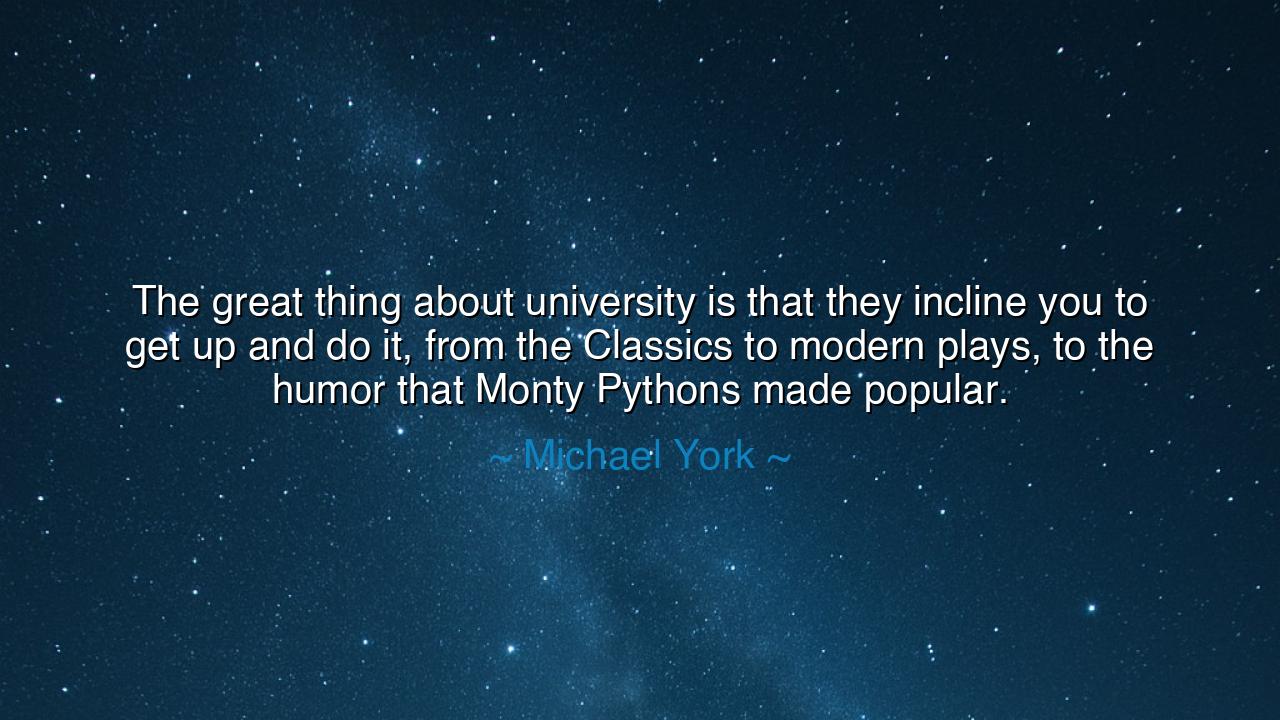
The great thing about university is that they incline you to get
The great thing about university is that they incline you to get up and do it, from the Classics to modern plays, to the humor that Monty Pythons made popular.






The words of Michael York—“The great thing about university is that they incline you to get up and do it, from the Classics to modern plays, to the humor that Monty Python made popular”—speak with the bright voice of a man who has journeyed through both scholarship and art. Beneath their calm tone lies a fire: the celebration of learning that inspires action, of education that breathes life into courage. York’s words remind us that the true gift of a university—or any place of wisdom—is not mere knowledge, but the awakening of the will, the spark that urges one to rise, create, perform, and bring forth the hidden talents of the soul.
For too many, learning becomes a prison of the mind: a hoard of words, formulas, and facts that never find expression. But what York praises is the kind of education that stirs the blood, that transforms the student from listener into doer. When he speaks of the Classics, he invokes the eternal legacy of ancient Greece and Rome—the tragedies of Sophocles, the eloquence of Cicero, the laughter of Aristophanes—all those voices that taught not only wisdom, but the art of action. To study the Classics, in York’s sense, is to commune with heroes who did, not merely thought; who turned vision into deed and philosophy into living truth.
In the same breath, York speaks of modern plays and the humor of Monty Python, as though to weave a golden thread between the past and the present. This is no accident. He recognizes that true art—whether born in Athens’ marble amphitheaters or in a London comedy troupe—shares a single heartbeat: the impulse to express, to experiment, to “get up and do it.” The humor of Monty Python, absurd yet profound, was itself a revolution. It mocked the old structures, but in doing so, it carried forward the same irreverent spirit that animated the satire of Aristophanes or the wit of Voltaire. Thus, York’s words tell us that learning is not about preserving the past—it is about transforming it into living energy that shapes the present.
There is an echo of ancient truth in his praise. For in the days of Plato’s Academy and Aristotle’s Lyceum, education was never meant to be passive. The philosopher and the student walked together beneath olive trees, debating, questioning, creating. They learned not by memorizing, but by living knowledge. They wrote plays, explored the stars, built cities, sang hymns, and danced at festivals. Education was the flame that set life alight. York’s celebration of the university recalls this very spirit—he honors the idea of a learning that gives wings to imagination, that encourages creation rather than imitation.
We can find the same spirit in the story of Leonardo da Vinci, the eternal student. Though he had no “university” as we know it, his mind was a cathedral of curiosity. He studied anatomy, engineering, painting, and philosophy not to accumulate, but to act—to invent, to paint, to design machines that still astonish us centuries later. Leonardo, like York’s ideal student, was one who “got up and did it.” He shows us that true knowledge, when united with boldness, becomes creation. Without that courage, knowledge remains a library locked in silence.
The deeper message of York’s quote, then, is this: education is a beginning, not an end. Its purpose is not to make us safe, but to make us daring—to awaken the creator, the performer, the thinker, and the builder within us. To study the Classics is to learn where we come from; to explore modern plays is to discover where we are; to embrace humor, like Monty Python’s, is to find the freedom to be human—to laugh, to question, to see the world anew. When the mind and the spirit unite in such harmony, life itself becomes a stage for creativity and wisdom.
Let this be the teaching passed down: Do not study only to know—study to act. Let knowledge kindle courage, and let courage turn wisdom into work. Read the greats, but then rise and write your own words. Learn the rules, but dare to play with them. Let laughter be your companion as much as logic, for humor opens the heart where intellect alone cannot reach. Whether in art, science, or daily life, the call remains the same: “Get up and do it.”
So remember the wisdom of Michael York, who saw that learning without creation is like flame without warmth. Let every lesson you gain become a step toward expression. Stand upon the shoulders of the ancients, but dance with the joy of the moderns. For the world does not need knowledge stored in silence—it needs souls who act, who bring forth beauty, courage, and laughter, and in doing so, keep the great fire of humanity forever burning.






AAdministratorAdministrator
Welcome, honored guests. Please leave a comment, we will respond soon